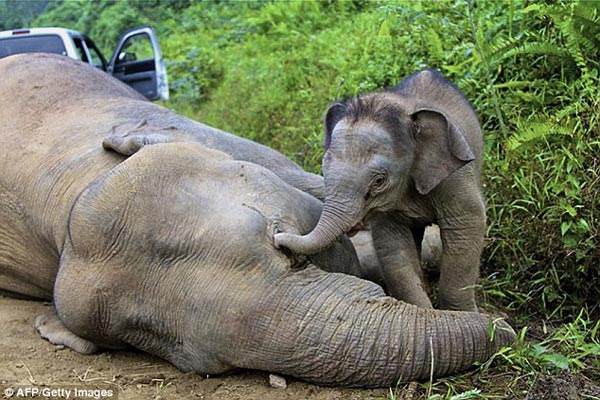Pygmy elephant calf desperately tries to wake up dead mother who was one of ten
animals found poisoned
January
29, 2013 David Wilkes, dailymail.co.uk
Again and again, the baby elephant nudged its mother’s head hoping desperately for a sign of movement. It was to no avail. She had become another victim of a mysterious spate of deaths in the tropical rainforest.
If wildlife officials had not led the three-month-old infant to safety, it would probably have remained beside its mother until it, too, died. Its distress moved the rescuers to tears, and left them desperate to discover who or what caused the tragedy. In total, ten Borneo pygmy elephants have been found dead in three weeks at the Gunung Rara Forest Reserve.
The bodies were all near to each other and while poisoning appears to be the likely cause, it has yet to be determined whether it was intentional. The animals still had their tusks, indicating that they had not been killed by poachers, and none had gunshot wounds.
More... Campaigners demand 'world's loneliest elephant' should be sent to Thailand to find some friends
The reserve’s head vet Sen Nathan said the elephants were all thought to be part of the same family group, and were aged between four and 20.
It has been said that Walt Disney could not have created a cuter creature than Borneo elephants, which have distinctive baby-faced features, oversized ears and long tails. They grow to 8ft tall, a foot or two shorter than mainland Asian elephants. Fewer than 1,500 are believed to be in existence.
Will Travers, who founded the Born Free Foundation with his actor parents Virginia McKenna and Bill Travers, said: ‘I have seen on numerous occasions that where the mother has died and the calf has nowhere else to go, it often stands by her until it too dies. So I’m not surprised by the image but I’m deeply saddened by it.’
He added
that elephant calves are not fully weaned until they are three and a half or
four. A male is likely to stay with its mother until it is around ten, and a
female possibly for life.
Many animal behaviour experts believe that elephants mourn their dead just like humans. Mr Travers said that a combination of close social bonds, excellent memory and long lifespan leads to the animals experiencing emotions similar to our own. ‘We call it grief, in elephant language it is something else, but it is the same emotion.’
Oxford University research found elephants mourn their dead by ‘kissing’ their bodies with their trunks and even rocking to and fro with grief. The creatures also show compassion towards the sick and dying, trying to nurse them back to health. A separate study found that elephants seem to be compelled to visit carcasses over and over again – even when the animal is long dead. And calves orphaned by poachers are known to suffer nightmares, before losing the will to live and dying of grief.
Elephants are not alone in exhibiting human-like emotions. For instance, magpies hold ‘funerals’ for fallen friends, laying ‘wreaths’ of grass along roadside corpses. And dolphins will stay by the side of stillborn calves for days.
Read more: International Anti-Poaching Foundation Help us help them
See more: Nature/Human Impact Page